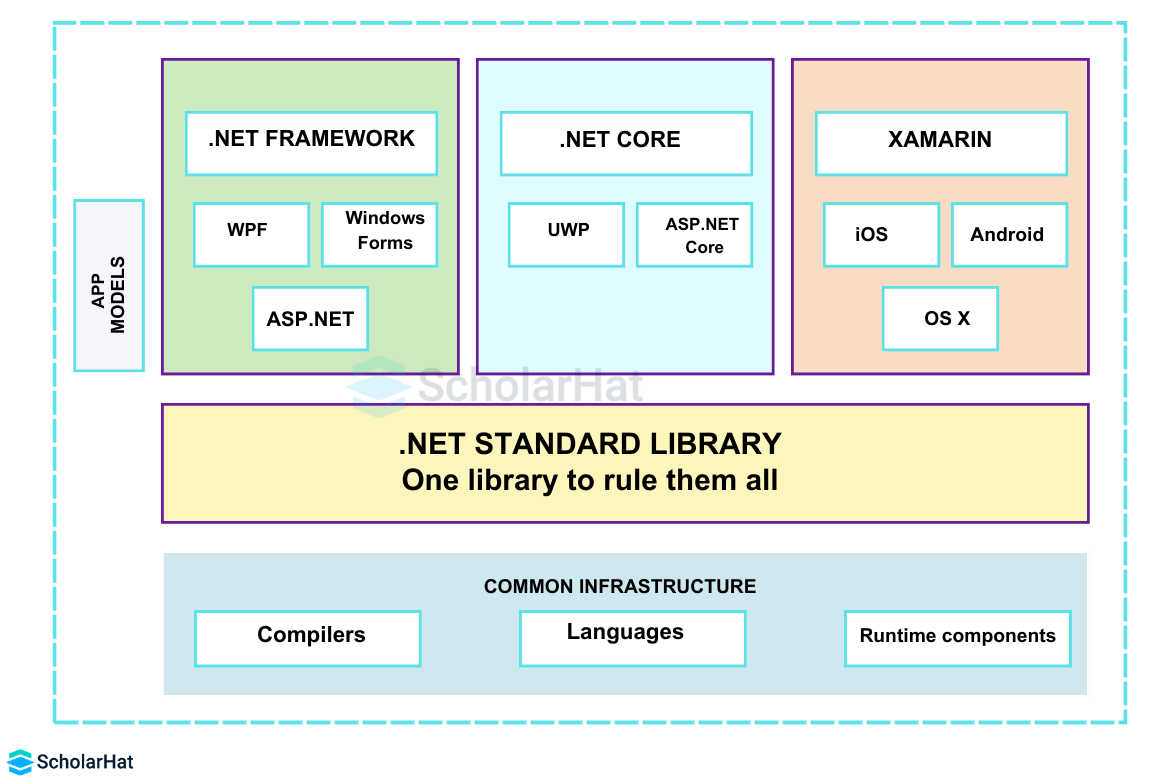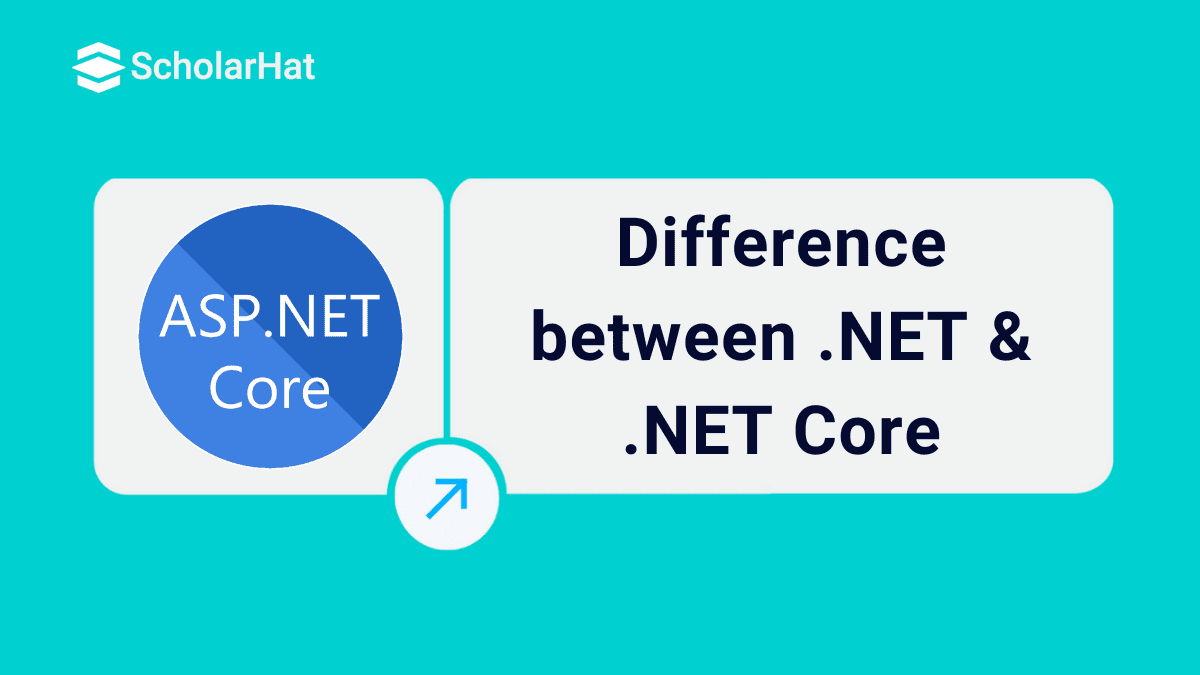06
FebDifference between .Net and .Net Core
.Net Vs .Net Core
.NET vs.NET Core represents a significant leap in Microsoft's development frameworks. .NET was originally intended for Windows as a powerful platform with a large library to support a variety of programming languages. However, with the introduction of.NET Core, Something changed, providing a modern, open-source, cross-platform framework perfect for developing applications that operate on Windows, macOS, and Linux. This transition addresses the demand for more modular, scalable, and high-performance applications, which is consistent with the current trend toward cloud-based and platform-agnostic development. The release of.NET Core is a big step toward embracing open-source and community-driven initiatives, broadening the possibilities for developers globally.
In this ASP.NET Tutorial, we will explore the Difference between .Net and .Net Core, including Net core advantages and .Net advantages also we will analyze between .NET Core and .NET, Which One is Better to Choose. ASP.NET powers 35% of modern web applications. Don’t miss out—join our Free ASP.NET MVC Course today!
.NET Framework Advantages
1. Learning Curve
- If you're a developer working with .NET and Need to create and deploy something quickly without having the time to learn .NET Core, then stick with the. NET Framework.
- Because NET Core can be a bit of a challenge.
2. Maintainance
- For those who are maintaining and updating existing .NET applications sticking with the .NET Framework is the option.
- Converting an existing.NET application to a.NET Core one will require some effort.
3. Evolution
- The current state of the.NET Framework is stable.
- The latest version, 4.8 is expected to be released.
- There are no plans, for any updates or versions of the.NET Framework.
.NET Core Advantages
1. The .Net Core version
- When creating an application. you can get a little bit confused, between.NET Core and.NET Framework.
- Opting for.NET Core is the recommended choice.
- Microsoft recently unveiled.NET Core version 3.0 an iteration of the platform.
- If you aim to develop and prepare for what lies investing in learning and utilizing .NET Core would be beneficial. .NET 3.0 now supports WPF and Windows Forms. .NET Core 3.0 also supports cross-development between UWP, WPF, and Windows Forms. This provides developers the flexibility to bring modern interfaces of UWP into Windows Forms and WPF.
2. Requirement
- If you're developing an application and your company has given the .NET Core as the choice, you can go for it.
- Because .NET Core is more appropriate, for meeting platform requirements.
- Applications built with .NET Core can run on Windows, Linux, and macOS.
3. Open Source
- Microsoft uses open source code editor, Visual Studio Code works on all three operating systems; Windows, Linux, and macOS.
- VS Code supports the modern needs of code editors including IntelliSense and debugging.
- Most third-party editors, such as Sublime, Emacs, and VI, work with .NET Core.
- Containers are the VMs of today. .NET Core’s modularity, lightweight, and flexibility make it easier to deploy .NET Core apps in containers.
- Containers can be deployed on any platform, cloud, Linux, and Windows. .NET Core works well with both Docker and Azure Kubernetes Service.
4. Performance and scalability
- Performance and scalability were the two major focus areas when .NET Core was developed.
- The .NET Core and ASP.NET Core are the top-performing web frameworks according to some benchmarks.
Ecosystem of .NET

Let’s see the following .NET ecosystem architecture in detail,
1. The architecture of the NET ecosystem
- The.NET Framework,.NET Core, and Xamarin are the three main high-level components of the.NET ecosystem, as you can see from the diagram above.
- Xamarin is not a topic for discussion. Xamarin is your only option if you want to use C# to create mobile (iOS, Android, and Windows Mobile) apps.
2. The Framework for.NET
- It supports Web and Windows applications.
- These days, you may create Windows applications in the.NET Framework with Windows Forms, WPF, and UWP.
- The.NET Framework's ASP.NET MVC is used to create Web applications.
3 .NET Core
- It is a brand-new cross-platform, open-source framework for creating programs that run with Windows, Mac, and Linux.
- Only ASP.NET Core and UWP are supported by.NET Core.
- To create Windows 10 targets, UWP is used. Windows
.NET Core and .NET: Which One Better to Choose
1. Evolution
The.NET Framework
- Overview; Microsoft unveiled the.NET Framework, in the 2000s to serve as a foundation for creating and operating Windows applications.
- Focus on Development: Mainly focused on crafting desktop and web applications for Windows.
- Evolution: Over time it has evolved into an established and reliable framework equipped with diverse libraries and tools to support a broad spectrum of application development needs.
.NET Core
- Introduction: Launched in 2016 .NET Core is an open-source framework that functions across platforms.
- Focus on Development: Geared towards facilitating application development practices such as microservices, cloud-based apps, and cross-platform scenarios.
- Evolution: It is modular, lightweight, and high-performing enabling developers to create applications that're compatible, with Windows, macOS, and Linux.
2. Platform Support
.NET Framework:
- Operating Systems: It supports Windows.
- Use Cases: Ideal for applications which integrated with different Windows features, like Windows Forms and Windows Presentation Foundation (WPF) applications.
.NET Core:
- Operating Systems: It has Cross-platform support for Windows, macOS, and Linux.
- Use Cases: It is Suitable for cloud-based applications, containerized applications, and applications.
3. The Performance and Scalability
.NET Framework
- Performance: The.NET Framework is not optimized for all contemporary performance requirements, despite offering strong performance for many use cases.
- Scalability: Best suited for applications with monolithic architectures.
.NET Core
- Performance: The .NET Core was created with performance in mind and provides notable speed and efficiency gains, particularly for online apps and microservices.
- Scalability: Its high scalability makes it ideal for cloud-native apps and microservices architecture.
4. Maintenance
.NET Framework
- Deployment: Version conflicts (sometimes referred to as "DLL Hell") may arise when the framework is not installed on the target machine.
- Maintenance: Closely linked with Windows updates, resulting in fewer updates.
.NET Core
- Deployment: To prevent version conflicts, self-contained apps can be delivered with all required dependencies.
- Maintenance: Regular improvements and upgrades, along with a more accommodating release schedule.
5. Tooling and Development of Ecosystem
Framework for.NET
- Tooling: A vast array of libraries and development tools are available in Visual Studio, providing rich support.
- Legacy Support: It is the go-to option for maintaining and updating current enterprise applications because of its extensive support for legacy applications.
.NET Core
- Tooling: Visual Studio, Visual Studio Code, and command-line interfaces all support modern tooling. A large variety of contemporary development workflows are also supported.
- Innovation: Constant innovation and improvement that embraces community involvement and contemporary development techniques.
The following table can surely help you to make your decision.
| Parameters | Which one is Better |
| High-performance | .Net Core is much faster than the .Net framework. |
| a scalable system without UI | .Net Core is highly scalable. |
| Docker containers support | .Net Core and .Net Framework both have support for docker containers, but .NET Core is born to live in a container. |
| Cross-platform | NET Core has cross-platform |
| Microservices | Both, but .NET Core is more used microservices |
| User interface | NET Framework is a better UI as compared to .Net Core |
Comparing .Net and .Net Core
| Factors | .NET Framework | .NET Core |
| Platform | It is a fully developed platform with all the necessary components for the development of software | It is an integrated part of the platform used for the development of applications like ASP.NET Core |
| Source Code | It is licensed and closed-source code | It is free and open-source code |
| Cross- platform | It is used to design and develop applications for Windows only. | It is used to design and develop applications for multiple operating systems like Windows, MacOS and Linus. |
| App Model | The application model of net framework includes WinForms, ASP.NET, and WPF. | the application model of .Net Core includes ASP.NET and Windows Universal Apps. |
| Installation | Net Framework has a single-packaged installation and runtime environment for Windows. | Net Core is cross-platform, hence it needs to be installed independently. |
| Support for Microservices | It Does not easily build off microservice-oriented systems quickly. | Net Core enables programmers to develop custom microservices with the help of various programming languages. |
| CLI Tools | It is not appropriate for CLI tools. some developers find it difficult to use CLI with .Net Framework. | It supports CLI tools which the developers can use. There is an option to choose between CLI tools and IDE tools with Core. |
Future of .NET
- With the unification of the .NET ecosystem under .NET 5 and subsequent versions, Microsoft has laid a solid foundation for the platform's growth and expansion.
- .NET's cross-platform support and open-source nature have significantly expanded its reach, enabling developers to build and deploy applications on Windows, Linux, macOS, and in cloud environments with ease.
- This flexibility empowers developers to leverage the power of .NET in diverse environments, driving innovation and collaboration within the community.
- With a vibrant and engaged community, open-source projects, and a wealth of resources available, .NET remains a versatile and powerful platform for building a wide range of applications across different domains and platforms.
- As technology landscapes continue to evolve, .NET is poised to remain at the forefront of software development, driving innovation and empowering developers to build the next generation of transformative applications.
Conclusion:
In conclusion, the design and adaptability of the.NET Framework and.NET Core are the primary differences between them. While.NET Core is a more contemporary, cross-platform framework that facilitates development on Windows, macOS, and Linux, the.NET Framework is a more established, reliable platform meant primarily for creating Windows apps.
Boost your salary by 30% with in-demand ASP.NET Core skills. Join our ASP.NET Core Course now!
FAQs
Take our Aspnet skill challenge to evaluate yourself!

In less than 5 minutes, with our skill challenge, you can identify your knowledge gaps and strengths in a given skill.







